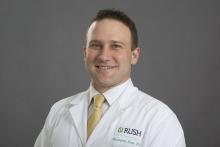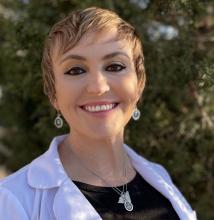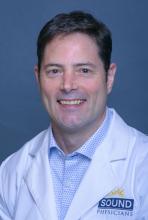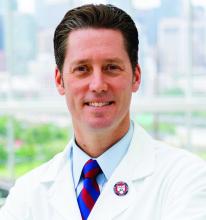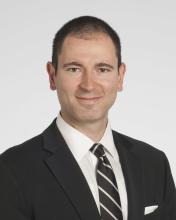User login
Clinical Leadership for Physicians
Christopher P. Bruti, MD, MPH
Dr. Christopher P. Bruti is the division chief of hospital medicine at Rush University and the program director of Rush’s combined Internal Medicine–Pediatrics Residency Program. He is an associate professor of internal medicine and pediatrics and practices as a hospitalist in both departments.
Dr. Bruti always rises to any challenge that comes his way with empathetic, organized, and insightful leadership. Dr. Bruti is known for his innovation in patient care and optimization practices in the hospital setting – from expanding and optimizing the nonteaching service and a high-functioning observation unit to geolocalization and reorganization of medical teams. While his reputation as a leader was well established before the pandemic hit, the way he rose to the many challenges over the past year has been truly remarkable. After he identified one of the first cases of COVID-19 in his hospital, Dr. Bruti’s leadership was evident. He ensured that his staff was wearing proper PPE, reorganized hospitalist staffing, coordinated onboarding of subspecialists, developed algorithms around testing, and created safety-driven patient transfer strategies.
He is a member of the Rush University Medical Center Medical Executive Committee and is the chair of its Medical Records Committee. He has been recognized by both Internal Medicine and Pediatrics clerkships multiple times for excellence in teaching.
Dr. Bruti became a member of SHM in 2014 and has been extremely active with the Chicago chapter. He has also served on the Quality Improvement and Pediatric Medicine Special Interest Groups.
Clinical Leadership for NPs & PAs
Krystle D. Apodaca, DNP, FHM
Dr. Krystle D. Apodaca is a nurse practitioner hospitalist at the University of New Mexico Hospital, where she is assistant professor of medicine within the university’s Clinician Education Track.
She was one of the first APPs welcomed into the UNM Hospital Medicine division and has been integral not only in the development of UNM’s APP program, but also its APP Hospital Medicine Fellowship, which she helped to cofound. She is a member of the UNM Hospital Medicine Executive Committee as well as its LGBTQ Collaborative.
She is known for her leadership within Project ECHO at UNM, a worldwide program focused on democratizing medical knowledge. She is the co–medical director of its National Nursing Home COVID-19 Safety and Medicaid Quality Improvement Hospitalization Avoidance efforts, both focused on improving nursing home practices. This program, in partnership with the Agency for Healthcare Research and Quality, UNM’s ECHO Institute, and the Institute for Healthcare Improvement, is now a national initiative dedicated to standardizing COVID-19 best practices at nursing homes across the country. To achieve its goals, more than 15,000 nursing homes have been certified and a community of more than 250 training centers has been built through Project ECHO.
Dr. Apodaca has been a member of SHM since 2015. She has been an active member of SHM’s NP/PA Special Interest Group since she joined and was appointed as the first APP president of SHM’s New Mexico chapter in April 2020. Under her leadership, the chapter achieved Gold and Platinum status as well as the Chapter of the Year Award. She is also a Fellow in Hospital Medicine.
Certificate of Leadership in Hospital Medicine
Mihir Patel, MD, MBA, MPH, CLHM, SFHM
The Certificate of Leadership in Hospital Medicine (CLHM) cultivates leadership skills in the context of specific hospital medicine challenges. This designation informs employers – or potential employers – with confidence that a candidate is equipped and ready to lead teams and grow an organization.
Dr. Mihir Patel serves as medical director of virtual medicine and a full-time hospitalist at Ballad Health in Johnson City, Tenn. He also works part time as a telehospitalist with Sound Physicians, covering multiple hospitals in California and Washington State. He has previously served in a number of administrative roles including medical director of hospitalist program, chief of staff, and director of medical informatics committee, in addition to working as hospitalist in both rural and urban hospitals. He is cofounder and president of the Blue Ridge Chapter of the Society of Hospital Medicine.
Dr. Mihir’s research and clinical interests focus on integration of telemedicine, electronic medical records, and principles of lean healthcare to reduce waste and cost of care while improving overall quality and safety.
Humanitarian Services
Eileen Barrett, MD, MPH, MACP, SFHM
Dr. Eileen Barrett is an internal medicine hospitalist at the University of New Mexico, where she also serves as associate professor of medicine and the director of Continuing Medical Education in the Office of Continuous Professional Learning.
In addition to current clinical and educational roles at UNM, Dr. Barrett has extensive leadership experience as the former director of Graduate Medical Education Wellness Initiatives, the current District 10 Chair of SHM, as chair of a multiorganizational Diversity Equity and Inclusion (DEI) Collaborative Task Force, and as a former regent of the American College of Physicians.
Her tremendous efforts in humanitarian services are reflected in her dedication to supporting communities in need. In 2015, Dr. Barrett traveled to Sierra Leone, where she served as an Ebola response clinician. There, she helped to develop safer care protocols, including initiating morning huddles, standardizing onboarding, and improving medication administration and documentation. These skills were developed while she worked for the Navajo Area Indian Health Service (including as an infection control consultant) for more than 9 years and in volunteering at the Myanmar-Thai border with refugees. Her work abroad helped support her training for directing UNM hospitalist COVID-19 Operations while also providing direct care.
Dr. Barrett has represented the specialty of hospital medicine both nationally and internationally. She has served on national committees and spoken from the perspective of an academic and community hospitalist leader on issues such as performance management, patient engagement, DEI, and professional fulfillment.
She has been a member of SHM since 2014 and has served as cochair of the three most recent Innovations Poster Competitions. Dr. Barrett is a former president of SHM’s New Mexico chapter where under her leadership the chapter received SHM’s Outstanding Chapter Award in 2018. She is a dedicated member of SHM’s Physicians in Training Committee and Chapter Support Committee. Dr. Barrett is an elected member of the Gold Humanism Honor Society, received a 2019 Exemplary Mentor Award from the American Medical Women’s Association, and is a Senior Fellow in Hospital Medicine.
Leadership for Practice Management
Leah Lleras, MS
Leah Lleras is the division administrator for the University of Colorado, Anschutz Medical Campus, and holds a Master of Science Management and Organization degree from the University of Colorado.
Her leadership as a practice manager is exemplified through her efforts in challenges of salary inequity. After joining the Division of Hospital Medicine in 2018, Ms. Lleras was successful in launching and achieving compensation equity and transparency across the department. She has demonstrated an incredible ability to collaborate with clinical leadership to marry the vision of clinical leaders with the administrative support required to turn a vision into a reality. During the COVID-19 pandemic, Ms. Lleras has been instrumental in ensuring that the division was prepared and supported to care for an influx of new patients. She did this by leading emergent onboarding of new practitioners, strategizing financial management of hazard pay for frontline clinicians, and creating a streamlined budget system during rapid change.
Ms. Lleras joined the Society in 2018 and has been an active member of the Rocky Mountain Chapter and the Hospital Medicine Administrator Special Interest Group.
Outstanding Service
Robert Zipper, MD, MMM, SFHM
Dr. Robert Zipper is a physician advisor and senior policy advisor for Sound Physicians, with more than 20 years of clinical experience as a hospital medicine leader.
He has a diverse background in quality and patient safety, hospitalist program design, and performance management. He began working as a hospitalist in 1999, in private practice. In 2006, he launched his career at Sound, where he began as a hospitalist but eventually managed Sound’s West Coast programs. In 2017, he was appointed Sound vice president of innovation technology. He later became Sound’s leader for healthcare policy, and now serves as a senior policy advisor for Sound, and physician advisor within the Advisory Services line.
Dr. Zipper has been a longtime supporter and advocate of SHM and the field of hospital medicine since joining in 2005. He attended his first Leadership Academy in 2006 and went on to serve as facilitator four times. His passion for SHM’s conferences is evident, as he has presented at three Annual Conferences alongside notable SHM leaders. He has been active in a variety of committees, including Quality and Safety, Leadership, and Performance Measurement and Reporting.
He is a member of the Society’s Public Policy Committee, and his insight has elevated hospital medicine both in the eyes of peer specialties and in discussions with the Centers for Medicare and Medicaid Services. Dr. Zipper has joined a number of calls with key Capitol Hill and CMS staff to help advocate for issues affecting hospital medicine. His ability to explain issues clearly and eloquently has helped stakeholders better understand the issues and move them forward on lawmakers’ agendas.
Research
S. Ryan Greysen, MD, MHS, SFHM
Dr. S. Ryan Greysen is chief of the Section of Hospital Medicine and associate professor at the University of Pennsylvania. He is the executive director for the Center for Evidence-based Practice (CEP) which serves all hospitals in the University of Pennsylvania Health System.
Dr. Greysen’s work comprises more than 80 peer-reviewed publications focused on improving outcomes of care for older adults during and after acute illness. Prior to arriving at Penn, he practiced at the University of California, San Francisco, where the impact of his work was extremely visible on the wards. He helped implement care pathways for an Acute Care for Elders (ACE) unit that uses evidence-based protocols and order sets to prevent functional decline and delirium of vulnerable seniors.
At Penn, he has continued to champion care for seniors and has supported other successful programs focused on vulnerable populations: SOAR (Supporting Older Adults at Risk), STEP (Supporting Transitions and Empowering Patients), and MED (Mental health Engagement navigation & Delivery).
During the COVID-19 pandemic, Dr. Greysen helped to accelerate the synthesis of emerging evidence through CEP and the Hospital Medicine Re-engineering Network (HOMERuN) to produce rapid evidence summaries in record speed. These reports have been broadly disseminated across other networks, such as AHRQ and the VA Evidence Synthesis Program.
Since joining the Society 10 years ago, Dr. Greysen has been an engaged member of SHM’s Greater Philadelphia Chapter and has held leadership roles on SHM’s Research Committee and the JHM Editorial Team as an associate editor. He has presented at multiple SHM annual conferences and is an ambassador of the specialty and of the importance of research in hospital medicine.
He is a Senior Fellow in Hospital Medicine.
Teaching
Grace C. Huang, MD
Dr. Grace C. Huang is an educator and hospitalist at Beth Israel Deaconess Medical Center and associate professor of medicine at Harvard Medical School who epitomizes commitment to education and lifelong learning.
Dr. Huang’s nationally recognized hospitalist expertise spans medical education and innovation, administrative management, and editorial leadership. She was among the early hospitalist pioneers who helped to transform how residents were trained to do procedures. Her early work led to the creation of one of the first procedure rotations for residents in the country – an RCT on central line simulation, the validation of a central line placement instrument, and a systematic review on procedural training for nonsurgeons.
Dr. Huang is vice chair for career development and mentoring in the department of medicine and oversees faculty development at the institutional level. She leads a Harvard Medical School–wide medical education fellowship for faculty and codirects the BIDMC Academy. On a broader scale, her efforts in the field have helped to catalyze the growth of computer-based simulation, define new standards for critical thinking education, and influence high-value care and invasive bedside procedure teaching approaches. Finally, she is editor-in-chief of MedEdPORTAL, an innovative journal of the Association of American Medical Colleges that publishes and disseminates educational resources.
Dr. Huang has been awarded the Gordon J. Strewler Mentoring of Resident Research Award in 2018, the Robert Stone Award for Excellence in Teaching Award, and most recently the A. Clifford Barger Excellence in Mentoring Award at Harvard Medical School, among many others. She is an editorial board member of Academic Medicine.
Dr. Huang joined SHM in 2010. Since then, she has been an engaged member of the Boston Chapter and has regularly participated in SHM’s annual conferences. She was also a member of SHM’s Practice Analysis Committee for 7 years.
Teamwork in Quality Improvement
Intermountain Healthcare
Intermountain Healthcare is a not-for-profit health system based in Salt Lake City serving the needs of patients primarily in Utah, Idaho, and Nevada. Intermountain recently reimagined its leadership structure with an integrated approach focused on developing and implementing common goals across its 23-hospital healthcare system, which was previously divided into regions. With key focus areas including communication, best practices, and goal setting, this structure has helped to combat former fragmentation struggles by creating an environment that provides a consistent high-level care experience regardless of the treatment center a patient selects.
With this reorganization came improved structure allowing for a unique team-based approach while still promoting clear communication lines across the 23 hospitals. This innovative Med/Surg Operations Lane allowed for flexible adaptation to the rapidly changing landscape of the COVID-19 pandemic. Intermountain Healthcare utilized its new framework to ensure crisis-ready operations by defining best practices through real-time literature review and teaming with ED, ICU, and Nursing to create COVID-19 workflows, order sets, and dashboards. Capacity issues were addressed with a variety of strategies: (1) daily systemwide huddles to facilitate load leveling between hospitals; (2) the use of telehealth for early discharges; and (3) remote patient monitoring and admission to the “Intermountain at Home” program, which preserved the ability to deliver critical surgical services.
This new value model clearly sets Intermountain apart from its peers.
Diversity
Lilia Cervantes, MD
Dr. Lilia Cervantes is associate professor in the department of medicine at Denver Health Medical Center and the University of Colorado, where she demonstrates an unparalleled commitment to diversity through her patient care, community service efforts, research, and health policy activism.
Following her internal medicine residency at the University of Colorado in 2008, Dr. Cervantes went on to obtain her master of science degree in clinical science, and became associate professor of medicine and a hospitalist at Denver Health Medical Center. In addition to her patient-centric roles at Denver Health, Dr. Cervantes has held a variety of roles in the health equity space. These include founding Denver Health Medical Center’s Health Equity Learning Series and the Healthcare Interest Program, a pre–health pipeline program for undergraduate students interested in a healthcare career.
Dr. Cervantes attributes her passion for becoming a physician to her background as a bilingual Latina who grew up in poverty. She says that her upbringing allows her to use this unique lens to connect with her diverse patient population and to advocate for marginalized communities and eliminate structural inequities.
Her experience with Hilda, an undocumented immigrant with kidney failure, was the catalyst for further research on marginalized patients without access to healthcare, which earned her interviews with NPR and CNN’s Chief Health Correspondent Dr. Sanjay Gupta. Her research and advocacy led to Colorado Medicaid’s expanding access to scheduled dialysis for undocumented immigrants with kidney failure. Upon announcement of the change, Dr. Cervantes was recognized as the driving force whose research informed the decision.
During the COVID-19 pandemic, Dr. Cervantes has worked diligently to launch research projects and create grant-funded programs to reduce the disproportionate burden of COVID-19 cases and deaths in the Latinx community in Denver. One of her studies centers on the Latinx community – through qualitative interviews of Latinx who had survived a COVID-19 hospitalization, Dr. Cervantes learned about the challenges faced during the pandemic. These findings informed local and national interventions to reduce COVID-19 in the Latinx community.
She has received numerous accolades, including the inaugural Outstanding Service to the Community in 2019 by Denver Health, the Florence Rena Sabin Award from the University of Colorado, and awards from the community – Health Equity Champion Award from the Center for Health Progress and the Unsung Heroine Award from the Latina First Foundation. She serves on several boards including two community-based organizations – the Center for Health Progress and Vuela for Health.
Dr. Cervantes has been an active member of SHM since 2009 and served as keynote speaker for the annual “Summit of the Rockies” Rocky Mountain Chapter SHM conference, “The role of advocacy: Moving the needle towards health equity.”
Junior Investigator Award
Matthew Pappas, MD, MPH, FHM
Dr. Matthew Pappas is a staff physician at the Cleveland Clinic, where he serves as assistant professor at the Lerner College of Medicine and Research Investigator at the Center for Value-Based Care Research.
Dr. Pappas completed his residency at the University of Michigan Health System and a postdoctoral fellowship with the VA Ann Arbor Healthcare System in 2016. Currently a hospitalist, he believes in addressing the tension between evidence-based and personal decisions, a fundamental hypothesis of his research career. As a Fellow, he created a model to predict the benefit of bridging anticoagulation for patients with atrial fibrillation. He sees his research mission as addressing the importance of these balanced decisions.
In 2019, Dr. Pappas secured a K08 award from the National Heart, Lung, and Blood Institute, and has turned his attention to preoperative cardiac testing and perioperative outcomes. He has published two manuscripts from this project, with a robust pipeline of others in progress.
He was recognized for his research by the Society of General Internal Medicine in 2018 with the Hamolsky Award for best abstract and had one of his research articles included in the Top 10 Articles of 2019 by the Journal of Hospital Medicine. Dr. Pappas has ongoing research support from the National Heart, Lung and Blood Institute.
He has been a member of SHM since 2015 and currently serves on the Perioperative Special Interest Group and Research Committee.
Clinical Leadership for Physicians
Christopher P. Bruti, MD, MPH
Dr. Christopher P. Bruti is the division chief of hospital medicine at Rush University and the program director of Rush’s combined Internal Medicine–Pediatrics Residency Program. He is an associate professor of internal medicine and pediatrics and practices as a hospitalist in both departments.
Dr. Bruti always rises to any challenge that comes his way with empathetic, organized, and insightful leadership. Dr. Bruti is known for his innovation in patient care and optimization practices in the hospital setting – from expanding and optimizing the nonteaching service and a high-functioning observation unit to geolocalization and reorganization of medical teams. While his reputation as a leader was well established before the pandemic hit, the way he rose to the many challenges over the past year has been truly remarkable. After he identified one of the first cases of COVID-19 in his hospital, Dr. Bruti’s leadership was evident. He ensured that his staff was wearing proper PPE, reorganized hospitalist staffing, coordinated onboarding of subspecialists, developed algorithms around testing, and created safety-driven patient transfer strategies.
He is a member of the Rush University Medical Center Medical Executive Committee and is the chair of its Medical Records Committee. He has been recognized by both Internal Medicine and Pediatrics clerkships multiple times for excellence in teaching.
Dr. Bruti became a member of SHM in 2014 and has been extremely active with the Chicago chapter. He has also served on the Quality Improvement and Pediatric Medicine Special Interest Groups.
Clinical Leadership for NPs & PAs
Krystle D. Apodaca, DNP, FHM
Dr. Krystle D. Apodaca is a nurse practitioner hospitalist at the University of New Mexico Hospital, where she is assistant professor of medicine within the university’s Clinician Education Track.
She was one of the first APPs welcomed into the UNM Hospital Medicine division and has been integral not only in the development of UNM’s APP program, but also its APP Hospital Medicine Fellowship, which she helped to cofound. She is a member of the UNM Hospital Medicine Executive Committee as well as its LGBTQ Collaborative.
She is known for her leadership within Project ECHO at UNM, a worldwide program focused on democratizing medical knowledge. She is the co–medical director of its National Nursing Home COVID-19 Safety and Medicaid Quality Improvement Hospitalization Avoidance efforts, both focused on improving nursing home practices. This program, in partnership with the Agency for Healthcare Research and Quality, UNM’s ECHO Institute, and the Institute for Healthcare Improvement, is now a national initiative dedicated to standardizing COVID-19 best practices at nursing homes across the country. To achieve its goals, more than 15,000 nursing homes have been certified and a community of more than 250 training centers has been built through Project ECHO.
Dr. Apodaca has been a member of SHM since 2015. She has been an active member of SHM’s NP/PA Special Interest Group since she joined and was appointed as the first APP president of SHM’s New Mexico chapter in April 2020. Under her leadership, the chapter achieved Gold and Platinum status as well as the Chapter of the Year Award. She is also a Fellow in Hospital Medicine.
Certificate of Leadership in Hospital Medicine
Mihir Patel, MD, MBA, MPH, CLHM, SFHM
The Certificate of Leadership in Hospital Medicine (CLHM) cultivates leadership skills in the context of specific hospital medicine challenges. This designation informs employers – or potential employers – with confidence that a candidate is equipped and ready to lead teams and grow an organization.
Dr. Mihir Patel serves as medical director of virtual medicine and a full-time hospitalist at Ballad Health in Johnson City, Tenn. He also works part time as a telehospitalist with Sound Physicians, covering multiple hospitals in California and Washington State. He has previously served in a number of administrative roles including medical director of hospitalist program, chief of staff, and director of medical informatics committee, in addition to working as hospitalist in both rural and urban hospitals. He is cofounder and president of the Blue Ridge Chapter of the Society of Hospital Medicine.
Dr. Mihir’s research and clinical interests focus on integration of telemedicine, electronic medical records, and principles of lean healthcare to reduce waste and cost of care while improving overall quality and safety.
Humanitarian Services
Eileen Barrett, MD, MPH, MACP, SFHM
Dr. Eileen Barrett is an internal medicine hospitalist at the University of New Mexico, where she also serves as associate professor of medicine and the director of Continuing Medical Education in the Office of Continuous Professional Learning.
In addition to current clinical and educational roles at UNM, Dr. Barrett has extensive leadership experience as the former director of Graduate Medical Education Wellness Initiatives, the current District 10 Chair of SHM, as chair of a multiorganizational Diversity Equity and Inclusion (DEI) Collaborative Task Force, and as a former regent of the American College of Physicians.
Her tremendous efforts in humanitarian services are reflected in her dedication to supporting communities in need. In 2015, Dr. Barrett traveled to Sierra Leone, where she served as an Ebola response clinician. There, she helped to develop safer care protocols, including initiating morning huddles, standardizing onboarding, and improving medication administration and documentation. These skills were developed while she worked for the Navajo Area Indian Health Service (including as an infection control consultant) for more than 9 years and in volunteering at the Myanmar-Thai border with refugees. Her work abroad helped support her training for directing UNM hospitalist COVID-19 Operations while also providing direct care.
Dr. Barrett has represented the specialty of hospital medicine both nationally and internationally. She has served on national committees and spoken from the perspective of an academic and community hospitalist leader on issues such as performance management, patient engagement, DEI, and professional fulfillment.
She has been a member of SHM since 2014 and has served as cochair of the three most recent Innovations Poster Competitions. Dr. Barrett is a former president of SHM’s New Mexico chapter where under her leadership the chapter received SHM’s Outstanding Chapter Award in 2018. She is a dedicated member of SHM’s Physicians in Training Committee and Chapter Support Committee. Dr. Barrett is an elected member of the Gold Humanism Honor Society, received a 2019 Exemplary Mentor Award from the American Medical Women’s Association, and is a Senior Fellow in Hospital Medicine.
Leadership for Practice Management
Leah Lleras, MS
Leah Lleras is the division administrator for the University of Colorado, Anschutz Medical Campus, and holds a Master of Science Management and Organization degree from the University of Colorado.
Her leadership as a practice manager is exemplified through her efforts in challenges of salary inequity. After joining the Division of Hospital Medicine in 2018, Ms. Lleras was successful in launching and achieving compensation equity and transparency across the department. She has demonstrated an incredible ability to collaborate with clinical leadership to marry the vision of clinical leaders with the administrative support required to turn a vision into a reality. During the COVID-19 pandemic, Ms. Lleras has been instrumental in ensuring that the division was prepared and supported to care for an influx of new patients. She did this by leading emergent onboarding of new practitioners, strategizing financial management of hazard pay for frontline clinicians, and creating a streamlined budget system during rapid change.
Ms. Lleras joined the Society in 2018 and has been an active member of the Rocky Mountain Chapter and the Hospital Medicine Administrator Special Interest Group.
Outstanding Service
Robert Zipper, MD, MMM, SFHM
Dr. Robert Zipper is a physician advisor and senior policy advisor for Sound Physicians, with more than 20 years of clinical experience as a hospital medicine leader.
He has a diverse background in quality and patient safety, hospitalist program design, and performance management. He began working as a hospitalist in 1999, in private practice. In 2006, he launched his career at Sound, where he began as a hospitalist but eventually managed Sound’s West Coast programs. In 2017, he was appointed Sound vice president of innovation technology. He later became Sound’s leader for healthcare policy, and now serves as a senior policy advisor for Sound, and physician advisor within the Advisory Services line.
Dr. Zipper has been a longtime supporter and advocate of SHM and the field of hospital medicine since joining in 2005. He attended his first Leadership Academy in 2006 and went on to serve as facilitator four times. His passion for SHM’s conferences is evident, as he has presented at three Annual Conferences alongside notable SHM leaders. He has been active in a variety of committees, including Quality and Safety, Leadership, and Performance Measurement and Reporting.
He is a member of the Society’s Public Policy Committee, and his insight has elevated hospital medicine both in the eyes of peer specialties and in discussions with the Centers for Medicare and Medicaid Services. Dr. Zipper has joined a number of calls with key Capitol Hill and CMS staff to help advocate for issues affecting hospital medicine. His ability to explain issues clearly and eloquently has helped stakeholders better understand the issues and move them forward on lawmakers’ agendas.
Research
S. Ryan Greysen, MD, MHS, SFHM
Dr. S. Ryan Greysen is chief of the Section of Hospital Medicine and associate professor at the University of Pennsylvania. He is the executive director for the Center for Evidence-based Practice (CEP) which serves all hospitals in the University of Pennsylvania Health System.
Dr. Greysen’s work comprises more than 80 peer-reviewed publications focused on improving outcomes of care for older adults during and after acute illness. Prior to arriving at Penn, he practiced at the University of California, San Francisco, where the impact of his work was extremely visible on the wards. He helped implement care pathways for an Acute Care for Elders (ACE) unit that uses evidence-based protocols and order sets to prevent functional decline and delirium of vulnerable seniors.
At Penn, he has continued to champion care for seniors and has supported other successful programs focused on vulnerable populations: SOAR (Supporting Older Adults at Risk), STEP (Supporting Transitions and Empowering Patients), and MED (Mental health Engagement navigation & Delivery).
During the COVID-19 pandemic, Dr. Greysen helped to accelerate the synthesis of emerging evidence through CEP and the Hospital Medicine Re-engineering Network (HOMERuN) to produce rapid evidence summaries in record speed. These reports have been broadly disseminated across other networks, such as AHRQ and the VA Evidence Synthesis Program.
Since joining the Society 10 years ago, Dr. Greysen has been an engaged member of SHM’s Greater Philadelphia Chapter and has held leadership roles on SHM’s Research Committee and the JHM Editorial Team as an associate editor. He has presented at multiple SHM annual conferences and is an ambassador of the specialty and of the importance of research in hospital medicine.
He is a Senior Fellow in Hospital Medicine.
Teaching
Grace C. Huang, MD
Dr. Grace C. Huang is an educator and hospitalist at Beth Israel Deaconess Medical Center and associate professor of medicine at Harvard Medical School who epitomizes commitment to education and lifelong learning.
Dr. Huang’s nationally recognized hospitalist expertise spans medical education and innovation, administrative management, and editorial leadership. She was among the early hospitalist pioneers who helped to transform how residents were trained to do procedures. Her early work led to the creation of one of the first procedure rotations for residents in the country – an RCT on central line simulation, the validation of a central line placement instrument, and a systematic review on procedural training for nonsurgeons.
Dr. Huang is vice chair for career development and mentoring in the department of medicine and oversees faculty development at the institutional level. She leads a Harvard Medical School–wide medical education fellowship for faculty and codirects the BIDMC Academy. On a broader scale, her efforts in the field have helped to catalyze the growth of computer-based simulation, define new standards for critical thinking education, and influence high-value care and invasive bedside procedure teaching approaches. Finally, she is editor-in-chief of MedEdPORTAL, an innovative journal of the Association of American Medical Colleges that publishes and disseminates educational resources.
Dr. Huang has been awarded the Gordon J. Strewler Mentoring of Resident Research Award in 2018, the Robert Stone Award for Excellence in Teaching Award, and most recently the A. Clifford Barger Excellence in Mentoring Award at Harvard Medical School, among many others. She is an editorial board member of Academic Medicine.
Dr. Huang joined SHM in 2010. Since then, she has been an engaged member of the Boston Chapter and has regularly participated in SHM’s annual conferences. She was also a member of SHM’s Practice Analysis Committee for 7 years.
Teamwork in Quality Improvement
Intermountain Healthcare
Intermountain Healthcare is a not-for-profit health system based in Salt Lake City serving the needs of patients primarily in Utah, Idaho, and Nevada. Intermountain recently reimagined its leadership structure with an integrated approach focused on developing and implementing common goals across its 23-hospital healthcare system, which was previously divided into regions. With key focus areas including communication, best practices, and goal setting, this structure has helped to combat former fragmentation struggles by creating an environment that provides a consistent high-level care experience regardless of the treatment center a patient selects.
With this reorganization came improved structure allowing for a unique team-based approach while still promoting clear communication lines across the 23 hospitals. This innovative Med/Surg Operations Lane allowed for flexible adaptation to the rapidly changing landscape of the COVID-19 pandemic. Intermountain Healthcare utilized its new framework to ensure crisis-ready operations by defining best practices through real-time literature review and teaming with ED, ICU, and Nursing to create COVID-19 workflows, order sets, and dashboards. Capacity issues were addressed with a variety of strategies: (1) daily systemwide huddles to facilitate load leveling between hospitals; (2) the use of telehealth for early discharges; and (3) remote patient monitoring and admission to the “Intermountain at Home” program, which preserved the ability to deliver critical surgical services.
This new value model clearly sets Intermountain apart from its peers.
Diversity
Lilia Cervantes, MD
Dr. Lilia Cervantes is associate professor in the department of medicine at Denver Health Medical Center and the University of Colorado, where she demonstrates an unparalleled commitment to diversity through her patient care, community service efforts, research, and health policy activism.
Following her internal medicine residency at the University of Colorado in 2008, Dr. Cervantes went on to obtain her master of science degree in clinical science, and became associate professor of medicine and a hospitalist at Denver Health Medical Center. In addition to her patient-centric roles at Denver Health, Dr. Cervantes has held a variety of roles in the health equity space. These include founding Denver Health Medical Center’s Health Equity Learning Series and the Healthcare Interest Program, a pre–health pipeline program for undergraduate students interested in a healthcare career.
Dr. Cervantes attributes her passion for becoming a physician to her background as a bilingual Latina who grew up in poverty. She says that her upbringing allows her to use this unique lens to connect with her diverse patient population and to advocate for marginalized communities and eliminate structural inequities.
Her experience with Hilda, an undocumented immigrant with kidney failure, was the catalyst for further research on marginalized patients without access to healthcare, which earned her interviews with NPR and CNN’s Chief Health Correspondent Dr. Sanjay Gupta. Her research and advocacy led to Colorado Medicaid’s expanding access to scheduled dialysis for undocumented immigrants with kidney failure. Upon announcement of the change, Dr. Cervantes was recognized as the driving force whose research informed the decision.
During the COVID-19 pandemic, Dr. Cervantes has worked diligently to launch research projects and create grant-funded programs to reduce the disproportionate burden of COVID-19 cases and deaths in the Latinx community in Denver. One of her studies centers on the Latinx community – through qualitative interviews of Latinx who had survived a COVID-19 hospitalization, Dr. Cervantes learned about the challenges faced during the pandemic. These findings informed local and national interventions to reduce COVID-19 in the Latinx community.
She has received numerous accolades, including the inaugural Outstanding Service to the Community in 2019 by Denver Health, the Florence Rena Sabin Award from the University of Colorado, and awards from the community – Health Equity Champion Award from the Center for Health Progress and the Unsung Heroine Award from the Latina First Foundation. She serves on several boards including two community-based organizations – the Center for Health Progress and Vuela for Health.
Dr. Cervantes has been an active member of SHM since 2009 and served as keynote speaker for the annual “Summit of the Rockies” Rocky Mountain Chapter SHM conference, “The role of advocacy: Moving the needle towards health equity.”
Junior Investigator Award
Matthew Pappas, MD, MPH, FHM
Dr. Matthew Pappas is a staff physician at the Cleveland Clinic, where he serves as assistant professor at the Lerner College of Medicine and Research Investigator at the Center for Value-Based Care Research.
Dr. Pappas completed his residency at the University of Michigan Health System and a postdoctoral fellowship with the VA Ann Arbor Healthcare System in 2016. Currently a hospitalist, he believes in addressing the tension between evidence-based and personal decisions, a fundamental hypothesis of his research career. As a Fellow, he created a model to predict the benefit of bridging anticoagulation for patients with atrial fibrillation. He sees his research mission as addressing the importance of these balanced decisions.
In 2019, Dr. Pappas secured a K08 award from the National Heart, Lung, and Blood Institute, and has turned his attention to preoperative cardiac testing and perioperative outcomes. He has published two manuscripts from this project, with a robust pipeline of others in progress.
He was recognized for his research by the Society of General Internal Medicine in 2018 with the Hamolsky Award for best abstract and had one of his research articles included in the Top 10 Articles of 2019 by the Journal of Hospital Medicine. Dr. Pappas has ongoing research support from the National Heart, Lung and Blood Institute.
He has been a member of SHM since 2015 and currently serves on the Perioperative Special Interest Group and Research Committee.
Clinical Leadership for Physicians
Christopher P. Bruti, MD, MPH
Dr. Christopher P. Bruti is the division chief of hospital medicine at Rush University and the program director of Rush’s combined Internal Medicine–Pediatrics Residency Program. He is an associate professor of internal medicine and pediatrics and practices as a hospitalist in both departments.
Dr. Bruti always rises to any challenge that comes his way with empathetic, organized, and insightful leadership. Dr. Bruti is known for his innovation in patient care and optimization practices in the hospital setting – from expanding and optimizing the nonteaching service and a high-functioning observation unit to geolocalization and reorganization of medical teams. While his reputation as a leader was well established before the pandemic hit, the way he rose to the many challenges over the past year has been truly remarkable. After he identified one of the first cases of COVID-19 in his hospital, Dr. Bruti’s leadership was evident. He ensured that his staff was wearing proper PPE, reorganized hospitalist staffing, coordinated onboarding of subspecialists, developed algorithms around testing, and created safety-driven patient transfer strategies.
He is a member of the Rush University Medical Center Medical Executive Committee and is the chair of its Medical Records Committee. He has been recognized by both Internal Medicine and Pediatrics clerkships multiple times for excellence in teaching.
Dr. Bruti became a member of SHM in 2014 and has been extremely active with the Chicago chapter. He has also served on the Quality Improvement and Pediatric Medicine Special Interest Groups.
Clinical Leadership for NPs & PAs
Krystle D. Apodaca, DNP, FHM
Dr. Krystle D. Apodaca is a nurse practitioner hospitalist at the University of New Mexico Hospital, where she is assistant professor of medicine within the university’s Clinician Education Track.
She was one of the first APPs welcomed into the UNM Hospital Medicine division and has been integral not only in the development of UNM’s APP program, but also its APP Hospital Medicine Fellowship, which she helped to cofound. She is a member of the UNM Hospital Medicine Executive Committee as well as its LGBTQ Collaborative.
She is known for her leadership within Project ECHO at UNM, a worldwide program focused on democratizing medical knowledge. She is the co–medical director of its National Nursing Home COVID-19 Safety and Medicaid Quality Improvement Hospitalization Avoidance efforts, both focused on improving nursing home practices. This program, in partnership with the Agency for Healthcare Research and Quality, UNM’s ECHO Institute, and the Institute for Healthcare Improvement, is now a national initiative dedicated to standardizing COVID-19 best practices at nursing homes across the country. To achieve its goals, more than 15,000 nursing homes have been certified and a community of more than 250 training centers has been built through Project ECHO.
Dr. Apodaca has been a member of SHM since 2015. She has been an active member of SHM’s NP/PA Special Interest Group since she joined and was appointed as the first APP president of SHM’s New Mexico chapter in April 2020. Under her leadership, the chapter achieved Gold and Platinum status as well as the Chapter of the Year Award. She is also a Fellow in Hospital Medicine.
Certificate of Leadership in Hospital Medicine
Mihir Patel, MD, MBA, MPH, CLHM, SFHM
The Certificate of Leadership in Hospital Medicine (CLHM) cultivates leadership skills in the context of specific hospital medicine challenges. This designation informs employers – or potential employers – with confidence that a candidate is equipped and ready to lead teams and grow an organization.
Dr. Mihir Patel serves as medical director of virtual medicine and a full-time hospitalist at Ballad Health in Johnson City, Tenn. He also works part time as a telehospitalist with Sound Physicians, covering multiple hospitals in California and Washington State. He has previously served in a number of administrative roles including medical director of hospitalist program, chief of staff, and director of medical informatics committee, in addition to working as hospitalist in both rural and urban hospitals. He is cofounder and president of the Blue Ridge Chapter of the Society of Hospital Medicine.
Dr. Mihir’s research and clinical interests focus on integration of telemedicine, electronic medical records, and principles of lean healthcare to reduce waste and cost of care while improving overall quality and safety.
Humanitarian Services
Eileen Barrett, MD, MPH, MACP, SFHM
Dr. Eileen Barrett is an internal medicine hospitalist at the University of New Mexico, where she also serves as associate professor of medicine and the director of Continuing Medical Education in the Office of Continuous Professional Learning.
In addition to current clinical and educational roles at UNM, Dr. Barrett has extensive leadership experience as the former director of Graduate Medical Education Wellness Initiatives, the current District 10 Chair of SHM, as chair of a multiorganizational Diversity Equity and Inclusion (DEI) Collaborative Task Force, and as a former regent of the American College of Physicians.
Her tremendous efforts in humanitarian services are reflected in her dedication to supporting communities in need. In 2015, Dr. Barrett traveled to Sierra Leone, where she served as an Ebola response clinician. There, she helped to develop safer care protocols, including initiating morning huddles, standardizing onboarding, and improving medication administration and documentation. These skills were developed while she worked for the Navajo Area Indian Health Service (including as an infection control consultant) for more than 9 years and in volunteering at the Myanmar-Thai border with refugees. Her work abroad helped support her training for directing UNM hospitalist COVID-19 Operations while also providing direct care.
Dr. Barrett has represented the specialty of hospital medicine both nationally and internationally. She has served on national committees and spoken from the perspective of an academic and community hospitalist leader on issues such as performance management, patient engagement, DEI, and professional fulfillment.
She has been a member of SHM since 2014 and has served as cochair of the three most recent Innovations Poster Competitions. Dr. Barrett is a former president of SHM’s New Mexico chapter where under her leadership the chapter received SHM’s Outstanding Chapter Award in 2018. She is a dedicated member of SHM’s Physicians in Training Committee and Chapter Support Committee. Dr. Barrett is an elected member of the Gold Humanism Honor Society, received a 2019 Exemplary Mentor Award from the American Medical Women’s Association, and is a Senior Fellow in Hospital Medicine.
Leadership for Practice Management
Leah Lleras, MS
Leah Lleras is the division administrator for the University of Colorado, Anschutz Medical Campus, and holds a Master of Science Management and Organization degree from the University of Colorado.
Her leadership as a practice manager is exemplified through her efforts in challenges of salary inequity. After joining the Division of Hospital Medicine in 2018, Ms. Lleras was successful in launching and achieving compensation equity and transparency across the department. She has demonstrated an incredible ability to collaborate with clinical leadership to marry the vision of clinical leaders with the administrative support required to turn a vision into a reality. During the COVID-19 pandemic, Ms. Lleras has been instrumental in ensuring that the division was prepared and supported to care for an influx of new patients. She did this by leading emergent onboarding of new practitioners, strategizing financial management of hazard pay for frontline clinicians, and creating a streamlined budget system during rapid change.
Ms. Lleras joined the Society in 2018 and has been an active member of the Rocky Mountain Chapter and the Hospital Medicine Administrator Special Interest Group.
Outstanding Service
Robert Zipper, MD, MMM, SFHM
Dr. Robert Zipper is a physician advisor and senior policy advisor for Sound Physicians, with more than 20 years of clinical experience as a hospital medicine leader.
He has a diverse background in quality and patient safety, hospitalist program design, and performance management. He began working as a hospitalist in 1999, in private practice. In 2006, he launched his career at Sound, where he began as a hospitalist but eventually managed Sound’s West Coast programs. In 2017, he was appointed Sound vice president of innovation technology. He later became Sound’s leader for healthcare policy, and now serves as a senior policy advisor for Sound, and physician advisor within the Advisory Services line.
Dr. Zipper has been a longtime supporter and advocate of SHM and the field of hospital medicine since joining in 2005. He attended his first Leadership Academy in 2006 and went on to serve as facilitator four times. His passion for SHM’s conferences is evident, as he has presented at three Annual Conferences alongside notable SHM leaders. He has been active in a variety of committees, including Quality and Safety, Leadership, and Performance Measurement and Reporting.
He is a member of the Society’s Public Policy Committee, and his insight has elevated hospital medicine both in the eyes of peer specialties and in discussions with the Centers for Medicare and Medicaid Services. Dr. Zipper has joined a number of calls with key Capitol Hill and CMS staff to help advocate for issues affecting hospital medicine. His ability to explain issues clearly and eloquently has helped stakeholders better understand the issues and move them forward on lawmakers’ agendas.
Research
S. Ryan Greysen, MD, MHS, SFHM
Dr. S. Ryan Greysen is chief of the Section of Hospital Medicine and associate professor at the University of Pennsylvania. He is the executive director for the Center for Evidence-based Practice (CEP) which serves all hospitals in the University of Pennsylvania Health System.
Dr. Greysen’s work comprises more than 80 peer-reviewed publications focused on improving outcomes of care for older adults during and after acute illness. Prior to arriving at Penn, he practiced at the University of California, San Francisco, where the impact of his work was extremely visible on the wards. He helped implement care pathways for an Acute Care for Elders (ACE) unit that uses evidence-based protocols and order sets to prevent functional decline and delirium of vulnerable seniors.
At Penn, he has continued to champion care for seniors and has supported other successful programs focused on vulnerable populations: SOAR (Supporting Older Adults at Risk), STEP (Supporting Transitions and Empowering Patients), and MED (Mental health Engagement navigation & Delivery).
During the COVID-19 pandemic, Dr. Greysen helped to accelerate the synthesis of emerging evidence through CEP and the Hospital Medicine Re-engineering Network (HOMERuN) to produce rapid evidence summaries in record speed. These reports have been broadly disseminated across other networks, such as AHRQ and the VA Evidence Synthesis Program.
Since joining the Society 10 years ago, Dr. Greysen has been an engaged member of SHM’s Greater Philadelphia Chapter and has held leadership roles on SHM’s Research Committee and the JHM Editorial Team as an associate editor. He has presented at multiple SHM annual conferences and is an ambassador of the specialty and of the importance of research in hospital medicine.
He is a Senior Fellow in Hospital Medicine.
Teaching
Grace C. Huang, MD
Dr. Grace C. Huang is an educator and hospitalist at Beth Israel Deaconess Medical Center and associate professor of medicine at Harvard Medical School who epitomizes commitment to education and lifelong learning.
Dr. Huang’s nationally recognized hospitalist expertise spans medical education and innovation, administrative management, and editorial leadership. She was among the early hospitalist pioneers who helped to transform how residents were trained to do procedures. Her early work led to the creation of one of the first procedure rotations for residents in the country – an RCT on central line simulation, the validation of a central line placement instrument, and a systematic review on procedural training for nonsurgeons.
Dr. Huang is vice chair for career development and mentoring in the department of medicine and oversees faculty development at the institutional level. She leads a Harvard Medical School–wide medical education fellowship for faculty and codirects the BIDMC Academy. On a broader scale, her efforts in the field have helped to catalyze the growth of computer-based simulation, define new standards for critical thinking education, and influence high-value care and invasive bedside procedure teaching approaches. Finally, she is editor-in-chief of MedEdPORTAL, an innovative journal of the Association of American Medical Colleges that publishes and disseminates educational resources.
Dr. Huang has been awarded the Gordon J. Strewler Mentoring of Resident Research Award in 2018, the Robert Stone Award for Excellence in Teaching Award, and most recently the A. Clifford Barger Excellence in Mentoring Award at Harvard Medical School, among many others. She is an editorial board member of Academic Medicine.
Dr. Huang joined SHM in 2010. Since then, she has been an engaged member of the Boston Chapter and has regularly participated in SHM’s annual conferences. She was also a member of SHM’s Practice Analysis Committee for 7 years.
Teamwork in Quality Improvement
Intermountain Healthcare
Intermountain Healthcare is a not-for-profit health system based in Salt Lake City serving the needs of patients primarily in Utah, Idaho, and Nevada. Intermountain recently reimagined its leadership structure with an integrated approach focused on developing and implementing common goals across its 23-hospital healthcare system, which was previously divided into regions. With key focus areas including communication, best practices, and goal setting, this structure has helped to combat former fragmentation struggles by creating an environment that provides a consistent high-level care experience regardless of the treatment center a patient selects.
With this reorganization came improved structure allowing for a unique team-based approach while still promoting clear communication lines across the 23 hospitals. This innovative Med/Surg Operations Lane allowed for flexible adaptation to the rapidly changing landscape of the COVID-19 pandemic. Intermountain Healthcare utilized its new framework to ensure crisis-ready operations by defining best practices through real-time literature review and teaming with ED, ICU, and Nursing to create COVID-19 workflows, order sets, and dashboards. Capacity issues were addressed with a variety of strategies: (1) daily systemwide huddles to facilitate load leveling between hospitals; (2) the use of telehealth for early discharges; and (3) remote patient monitoring and admission to the “Intermountain at Home” program, which preserved the ability to deliver critical surgical services.
This new value model clearly sets Intermountain apart from its peers.
Diversity
Lilia Cervantes, MD
Dr. Lilia Cervantes is associate professor in the department of medicine at Denver Health Medical Center and the University of Colorado, where she demonstrates an unparalleled commitment to diversity through her patient care, community service efforts, research, and health policy activism.
Following her internal medicine residency at the University of Colorado in 2008, Dr. Cervantes went on to obtain her master of science degree in clinical science, and became associate professor of medicine and a hospitalist at Denver Health Medical Center. In addition to her patient-centric roles at Denver Health, Dr. Cervantes has held a variety of roles in the health equity space. These include founding Denver Health Medical Center’s Health Equity Learning Series and the Healthcare Interest Program, a pre–health pipeline program for undergraduate students interested in a healthcare career.
Dr. Cervantes attributes her passion for becoming a physician to her background as a bilingual Latina who grew up in poverty. She says that her upbringing allows her to use this unique lens to connect with her diverse patient population and to advocate for marginalized communities and eliminate structural inequities.
Her experience with Hilda, an undocumented immigrant with kidney failure, was the catalyst for further research on marginalized patients without access to healthcare, which earned her interviews with NPR and CNN’s Chief Health Correspondent Dr. Sanjay Gupta. Her research and advocacy led to Colorado Medicaid’s expanding access to scheduled dialysis for undocumented immigrants with kidney failure. Upon announcement of the change, Dr. Cervantes was recognized as the driving force whose research informed the decision.
During the COVID-19 pandemic, Dr. Cervantes has worked diligently to launch research projects and create grant-funded programs to reduce the disproportionate burden of COVID-19 cases and deaths in the Latinx community in Denver. One of her studies centers on the Latinx community – through qualitative interviews of Latinx who had survived a COVID-19 hospitalization, Dr. Cervantes learned about the challenges faced during the pandemic. These findings informed local and national interventions to reduce COVID-19 in the Latinx community.
She has received numerous accolades, including the inaugural Outstanding Service to the Community in 2019 by Denver Health, the Florence Rena Sabin Award from the University of Colorado, and awards from the community – Health Equity Champion Award from the Center for Health Progress and the Unsung Heroine Award from the Latina First Foundation. She serves on several boards including two community-based organizations – the Center for Health Progress and Vuela for Health.
Dr. Cervantes has been an active member of SHM since 2009 and served as keynote speaker for the annual “Summit of the Rockies” Rocky Mountain Chapter SHM conference, “The role of advocacy: Moving the needle towards health equity.”
Junior Investigator Award
Matthew Pappas, MD, MPH, FHM
Dr. Matthew Pappas is a staff physician at the Cleveland Clinic, where he serves as assistant professor at the Lerner College of Medicine and Research Investigator at the Center for Value-Based Care Research.
Dr. Pappas completed his residency at the University of Michigan Health System and a postdoctoral fellowship with the VA Ann Arbor Healthcare System in 2016. Currently a hospitalist, he believes in addressing the tension between evidence-based and personal decisions, a fundamental hypothesis of his research career. As a Fellow, he created a model to predict the benefit of bridging anticoagulation for patients with atrial fibrillation. He sees his research mission as addressing the importance of these balanced decisions.
In 2019, Dr. Pappas secured a K08 award from the National Heart, Lung, and Blood Institute, and has turned his attention to preoperative cardiac testing and perioperative outcomes. He has published two manuscripts from this project, with a robust pipeline of others in progress.
He was recognized for his research by the Society of General Internal Medicine in 2018 with the Hamolsky Award for best abstract and had one of his research articles included in the Top 10 Articles of 2019 by the Journal of Hospital Medicine. Dr. Pappas has ongoing research support from the National Heart, Lung and Blood Institute.
He has been a member of SHM since 2015 and currently serves on the Perioperative Special Interest Group and Research Committee.
FROM SHM CONVERGE 2021
